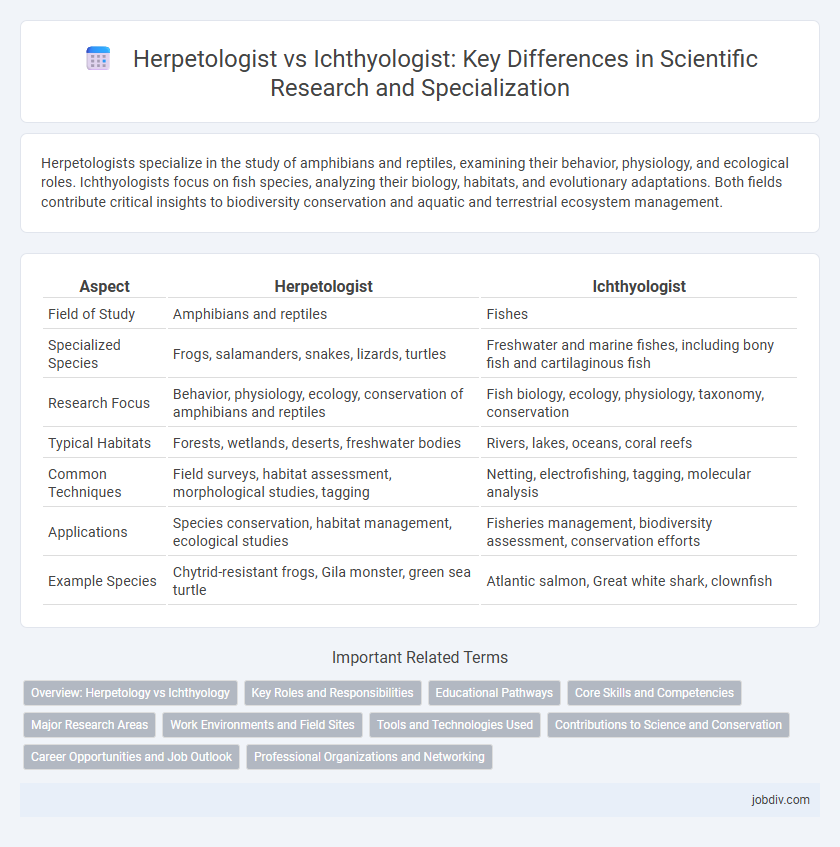Herpetologists specialize in the study of amphibians and reptiles, examining their behavior, physiology, and ecological roles. Ichthyologists focus on fish species, analyzing their biology, habitats, and evolutionary adaptations. Both fields contribute critical insights to biodiversity conservation and aquatic and terrestrial ecosystem management.
Table of Comparison
| Aspect | Herpetologist | Ichthyologist |
|---|---|---|
| Field of Study | Amphibians and reptiles | Fishes |
| Specialized Species | Frogs, salamanders, snakes, lizards, turtles | Freshwater and marine fishes, including bony fish and cartilaginous fish |
| Research Focus | Behavior, physiology, ecology, conservation of amphibians and reptiles | Fish biology, ecology, physiology, taxonomy, conservation |
| Typical Habitats | Forests, wetlands, deserts, freshwater bodies | Rivers, lakes, oceans, coral reefs |
| Common Techniques | Field surveys, habitat assessment, morphological studies, tagging | Netting, electrofishing, tagging, molecular analysis |
| Applications | Species conservation, habitat management, ecological studies | Fisheries management, biodiversity assessment, conservation efforts |
| Example Species | Chytrid-resistant frogs, Gila monster, green sea turtle | Atlantic salmon, Great white shark, clownfish |
Overview: Herpetology vs Ichthyology
Herpetology is the branch of zoology that studies amphibians and reptiles, focusing on their physiology, behavior, and ecology, while ichthyology is dedicated to the scientific study of fish species, including their anatomy, taxonomy, and environmental interactions. Both disciplines contribute essential knowledge to biodiversity conservation and aquatic ecosystem management, with herpetologists often examining terrestrial and freshwater habitats, whereas ichthyologists primarily investigate marine and freshwater environments. Research methods in herpetology frequently involve field observation and specimen collection of amphibians and reptiles, contrasting with ichthyological techniques that utilize netting, tagging, and sonar for fish population studies.
Key Roles and Responsibilities
Herpetologists specialize in studying amphibians and reptiles, focusing on their behavior, physiology, and habitats to contribute to conservation efforts and ecological research. Ichthyologists examine fish species, analyzing their genetics, aquatic ecosystems, and environmental impacts to support sustainable fisheries and biodiversity preservation. Both scientists use field research, laboratory analysis, and data modeling to understand species interactions and promote environmental health.
Educational Pathways
Herpetologists typically pursue a degree in biology, zoology, or ecology with specialized coursework in amphibians and reptiles, often engaging in fieldwork or research projects related to herpetofauna. Ichthyologists generally follow an educational path that emphasizes marine biology, ichthyology, or aquatic sciences, focusing on fish biology, anatomy, and aquatic ecosystems through both laboratory and field studies. Advanced degrees such as a master's or Ph.D. in specialized areas are common for both professions to enhance research capacities and career opportunities in academia, conservation, or environmental management.
Core Skills and Competencies
Herpetologists specialize in the study of amphibians and reptiles, requiring expertise in species identification, ecological surveying, and behavioral analysis, with strong skills in field research and taxonomy. Ichthyologists focus on fish biology, necessitating competencies in aquatic ecosystem assessment, fish physiology, and population dynamics, emphasizing skills in underwater sampling and data interpretation. Both disciplines demand proficiency in scientific research methods, data collection, and statistical analysis but differ in their organismal focus and habitat specialization.
Major Research Areas
Herpetologists primarily study reptiles and amphibians, focusing on their behavior, physiology, ecology, and conservation. Ichthyologists concentrate on fish species, examining their taxonomy, anatomy, genetics, and their role in aquatic ecosystems. Both fields contribute essential knowledge to biodiversity and environmental management through specialized research methods tailored to their respective animal groups.
Work Environments and Field Sites
Herpetologists primarily work in terrestrial and freshwater habitats such as forests, wetlands, and grasslands, studying reptiles and amphibians in both natural and laboratory settings. Ichthyologists conduct research in aquatic environments, including rivers, lakes, and oceans, often utilizing boats and underwater equipment to observe and collect fish specimens. Both specialists engage in fieldwork, but herpetologists focus on land and freshwater ecosystems while ichthyologists are immersed in diverse marine and freshwater biomes.
Tools and Technologies Used
Herpetologists employ tools such as capture nets, environmental data loggers, and GPS devices to monitor amphibians and reptiles in their natural habitats, while using advanced microscopy for detailed anatomical studies. Ichthyologists utilize sonar imaging, underwater remotely operated vehicles (ROVs), and electrofishing equipment to study fish behavior and aquatic ecosystems, complemented by genetic sequencing tools for species identification. Both disciplines leverage geographic information systems (GIS) and bioinformatics to analyze spatial distribution and evolutionary relationships.
Contributions to Science and Conservation
Herpetologists advance scientific understanding of amphibians and reptiles by studying their behavior, ecology, and physiology, contributing to biodiversity conservation and habitat preservation efforts. Ichthyologists focus on fish species' taxonomy, population dynamics, and aquatic ecosystems, playing a crucial role in sustainable fisheries management and aquatic habitat restoration. Both disciplines provide essential data that inform environmental policies and conservation strategies to protect vulnerable species and ecosystems.
Career Opportunities and Job Outlook
Herpetologists specialize in the study of amphibians and reptiles, with career opportunities in wildlife conservation, research institutions, and environmental consulting agencies, where demand is projected to grow moderately due to increasing environmental awareness. Ichthyologists focus on fish biology, often finding roles in fisheries management, aquatic ecosystem research, and marine conservation, with job prospects tied to the health of marine environments and commercial fishing industries. Both fields require advanced degrees, but ichthyology may offer broader opportunities in government and commercial sectors due to the economic importance of aquatic resources.
Professional Organizations and Networking
Herpetologists often engage with the Society for the Study of Amphibians and Reptiles (SSAR) to access specialized research, conferences, and collaboration opportunities. Ichthyologists typically connect through the American Fisheries Society (AFS), which fosters professional development and networking within fish biology and aquatic ecosystems. Both organizations provide critical platforms for publishing research, sharing fieldwork experiences, and advancing conservation efforts.
Herpetologist vs Ichthyologist Infographic

 jobdiv.com
jobdiv.com